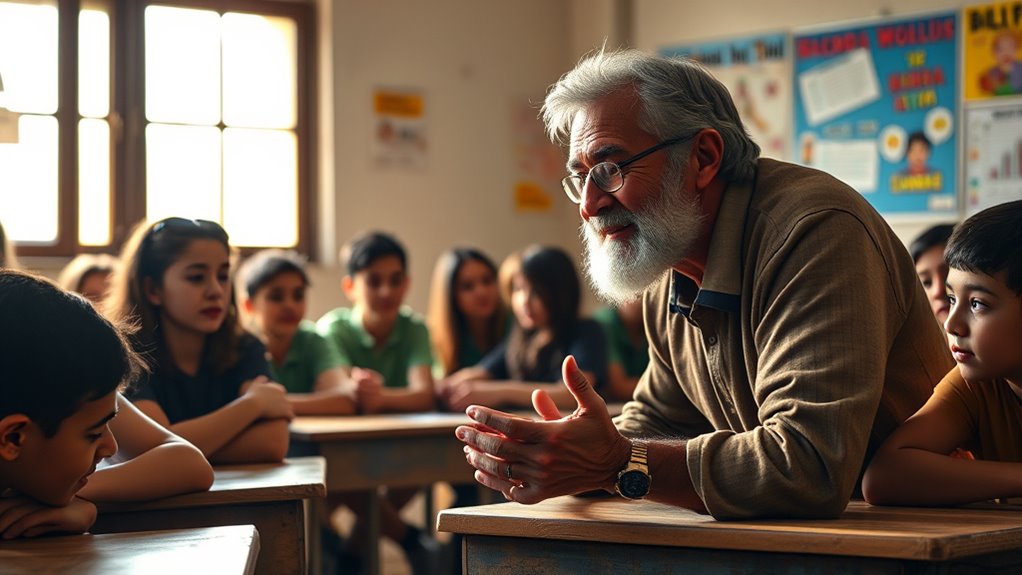Paulo Freire teaches us that teaching is an act of love rooted in empathy, genuine care, and relationship-building. When you approach students with respect and understanding, you create a safe space that encourages engagement and critical thinking. Through empowerment and dialogue, you help students see themselves as active participants and agents of change. This love-infused approach fosters confidence and lifelong learning, revealing the transformative power of education—continue to explore how love shapes meaningful teaching experiences.
Key Takeaways
- Freire views teaching as a loving act that involves genuine care, empathy, and fostering relationships to empower learners.
- Educators should create participatory, dialogue-based environments that encourage critical thinking and student agency.
- Teaching rooted in love builds trust, making students feel valued and motivated to engage in their own learning process.
- Empathy allows teachers to understand students’ perspectives, facilitating a safe space for exploration and critical consciousness.
- Education as an act of love aims to liberate students, transforming them from passive recipients into active agents of change.

Teaching, at its core, is an act of love—an intentional effort to empower others and nurture their growth. When you step into the classroom, you’re not just transferring knowledge; you’re building relationships rooted in understanding and respect. This is where educator empathy becomes essential. By truly seeing your students’ perspectives, you foster a safe environment where they feel valued and understood. When you listen actively and respond with compassion, you communicate that their experiences matter. This empathy isn’t just about kindness; it’s a strategic tool that helps you connect with each learner’s unique needs, making your teaching more effective and meaningful. When students sense that you genuinely care, they become more receptive to learning, more willing to take risks, and more motivated to succeed. That connection paves the way for student empowerment, a cornerstone in Freire’s philosophy.
Freire believed that education should be a liberating process—one that elevates students from passive recipients to active participants in their learning. When you empower your students, you give them the confidence to question, analyze, and challenge the world around them. This doesn’t happen by simply delivering information; it requires creating a participatory environment where students are encouraged to voice their thoughts and experiences. Through dialogue and shared inquiry, you help students see themselves as capable agents of change. This shift from rote memorization to critical thinking transforms the classroom into a space of mutual growth. When you treat students as equals, you recognize their potential and foster a sense of ownership over their learning journey. Student empowerment becomes a natural outcome of your intentional effort to connect authentically and respect their voices.
Furthermore, incorporating educator empathy into your teaching strategies facilitates the development of critical consciousness, which is central to Freire’s approach. In practice, this might mean giving students choices in their assignments or encouraging them to explore topics that resonate with their lives. It might involve asking open-ended questions that stimulate discussion and reflection. Your role isn’t to dictate knowledge but to facilitate a collaborative process where students develop their critical consciousness. When you embrace this approach, you embody the love Freire advocates—showing that education isn’t just about transferring facts, but about inspiring confidence and agency. By practicing educator empathy and actively empowering students, you cultivate a classroom atmosphere where growth is inevitable. Teaching becomes a shared journey, rooted in love and respect, where both teacher and student learn from each other and grow together. That’s the true essence of Freire’s philosophy: teaching as an act of love, designed to elevate and liberate.
Frequently Asked Questions
How Did Paulo Freire Influence Modern Educational Practices?
You see how Paulo Freire influences modern education by emphasizing critical consciousness and dialogic teaching. He encourages you to foster awareness of social issues, empowering students to question and transform their world. His approach promotes active dialogue, where teachers and students learn from each other, creating an inclusive environment. This shift from rote memorization to participatory learning shapes contemporary practices, making education more meaningful and responsive to learners’ realities.
What Are the Core Principles of Freire’s Pedagogy?
You embrace Freire’s pedagogy by fostering dialogue and empowering students to think critically. His core principles emphasize developing critical consciousness, where learners become aware of social injustices. You encourage active participation, view education as a liberating process, and see teachers and students as equals in a collaborative effort. This approach transforms learning into a shared journey of empowerment, inspiring real change and fostering social awareness.
How Can Teachers Incorporate Freire’s Ideas Today?
You can incorporate Freire’s ideas today by fostering student empowerment and encouraging critical thinking. Create a classroom environment where students actively participate, question assumptions, and connect lessons to real-life issues. Use dialogue instead of lectures, making learning a shared process. By valuing students’ voices and promoting reflective discussion, you help them develop agency and deeper understanding, embodying Freire’s belief that teaching is an act of love.
What Criticisms Have Been Made Against Freire’s Approach?
You might encounter pedagogy critiques suggesting Freire’s approach is too idealistic or difficult to implement in traditional settings. Critics also argue that his emphasis on dialogue and consciousness-raising can be overly political, sparking pedagogical debates about the practicality of such methods. Some say his ideas may overlook cultural or institutional constraints, making it challenging to apply his transformative vision universally without adjustments.
What Is the Legacy of Paulo Freire in Global Education?
His legacy is like a guiding star illuminating global education, inspiring change. You’ve seen it in adult literacy programs that empower learners to read and think critically. Freire’s focus on critical consciousness sparks awareness, encouraging students to challenge injustices. His approach encourages educators worldwide to foster dialogue and love, transforming classrooms into spaces of liberation and hope. His influence continues to shape education, making it a tool for social transformation.
Conclusion
Remember, teaching isn’t just a job—it’s a act of love, a shared journey you and your students undertake. When you pour your heart into each lesson, you create more than knowledge; you forge connections that last beyond the classroom. It’s no coincidence that the moments of true understanding often happen when your genuine care shines through. Keep loving what you do, because those small acts of kindness can change lives in ways you never imagined.









